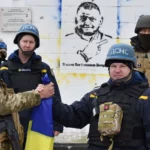Border police say 130,000 people have tried to enter EU territory from Balkans this year
The European Union has moved to shut down a swelling flow of migrants using the Balkans as a land route into the bloc.
A 20-point plan calls for EU border guards to operate outside the bloc in Albania, Montenegro and Serbia.
Border police have intercepted 130,000 people trying to enter the EU from the Balkan region this year. The number of arrivals reported coming via the Balkans from January to last month is three times as many as last year’s figure.
They are thought to include people from Syria, Tunisia, Morocco and Indiawho either came via the Eastern Mediterranean or arrived legally the Balkans.
Austria is piling pressure on EU leaders to act after many migrants reached the landlocked country via Hungary.
At a summit with Balkan leaders in Tirana, Albania, European Commission President Ursula von der Leyen on Tuesday said Austria’s concerns were justified.
“Austria is exceptionally hard hit, you have to say that without doubt,” Ms von der Leyen said.
“Austria is rightly asking for solidarity and needs help.”
But Austrian Chancellor Karl Nehammer responded coolly to the commission’s proposals, saying there was still much to discuss.
“The numbers are far too high,” he said. “We have 75,000 unregistered illegal migrants in Austria. That means they crossed an EU external border and reached an inland country like Austria.
“It’s about the security not only of Austria but of the European Union.”
Austria has persuaded Serbia, one of the Balkan countries, to stop giving visa-free access to Tunisians and Indians.
Interior Minister Gerhard Karner said closing that loophole had helped ease the pressure on Austria’s borders after 15,000 Indians and 11,400 Tunisians sought asylum this year.
He said on Monday the figure of 100 Tunisians a day being intercepted early last month had fallen to virtually zero.
But Austria says more action is needed at European level to make it easier to deport failed asylum seekers.
The EU’s plan would offer training to Balkan countries and calls for talks with Pakistan and Bangladesh on returning migrants.
In other measures, the commission said work was in progress to widen the remit of EU guards in three Balkan countries.
It means they could police the external borders of Albania, Montenegro and Serbia and not merely their EU-facing borders.
However, the five-page plan does not mention any change in EU deportation rules as requested by Austria.
“It’s at least a first important step,” but “there are still important demands from Austria … the EU’s external borders, asylum procedures, deportation guidelines so that the legal position changes,” Mr Nehammer said.
Dutch Prime Minister Mark Rutte said Europe was reaching the limit of how many migrants it could handle.
The Balkan countries “are in many cases countries of transit, for people moving from Syria or other parts of the world to the north of Europe,” he said.
Border agency Frontex last month said there were 22,300 arrivals in October, with numbers at their highest peak since the 2015 crisis.
People from Syria, Afghanistan and Turkey were described the main nationalities on that route.
Frontex accused migrants of “abusing visa-free access to the region” by landing at Belgrade’s airport and travelling to EU borders.
Others are believed to have arrived in the bloc by crossing into Cyprus, Greece or Bulgaria.
Alignment with EU policies is both a strategy against migration and one of the criteria for Balkan countries to eventually join the bloc.
Serbia, Kosovo, Albania, Bosnia and Herzegovina, North Macedonia and Montenegro are in various stages of the long accession process.
The war in Ukraine has given enlargement new momentum as the EU tries to keep neighbours out of Russia’s fold.
But there are many outstanding issues, including Serbia’s dispute with Kosovo and its continued relationship with Russia.
“Some countries are closer than others,” said Luxembourg’s Prime Minister Xavier Bettel.
“We know that the Balkans are a powder keg and that there have been many conflicts here.”
With full membership still expected to be a long way off, the EU offered sweeteners on Tuesday including a deal on mobile data roaming.
But Kosovo said at Tuesday’s summit that it deserved more credit for aligning with the EU regarding sanctions on Russia.
“We need the EU to move from words to deeds,” Kosovo’s President Vjosa Osmani said at the meeting in Albania.
EU’S 20-POINT MIGRATION PLAN
1. Send EU border guards to Balkans
2. €40 million for training and surveillance
3. Review EU border protection
4. Reward countries that fund Balkans
5. Help Balkans improve asylum system
6. Improve migrant reception facilities
7. Close gaps in EU registration system
8. Run pilots of faster asylum system
9. Improve relocation of migrants within EU
10. Bolster migration unit in Greece
11. Tackle smuggling at Serbia/Hungary border
12. Implement €30 million anti-smuggling plan
13. Sanctions on transport linked to smuggling
14. Expand pilot deportation scheme in Bosnia
15. Training for Balkans to deport migrants
16. Joint task forces with Balkans and countries of origin
17. Close loopholes in Balkan visa policy
18. Monitor migration laws passed in Balkans
19. Use visa-free travel as leverage over Balkans
20. Joint EU messages to Balkans and countries of origin















